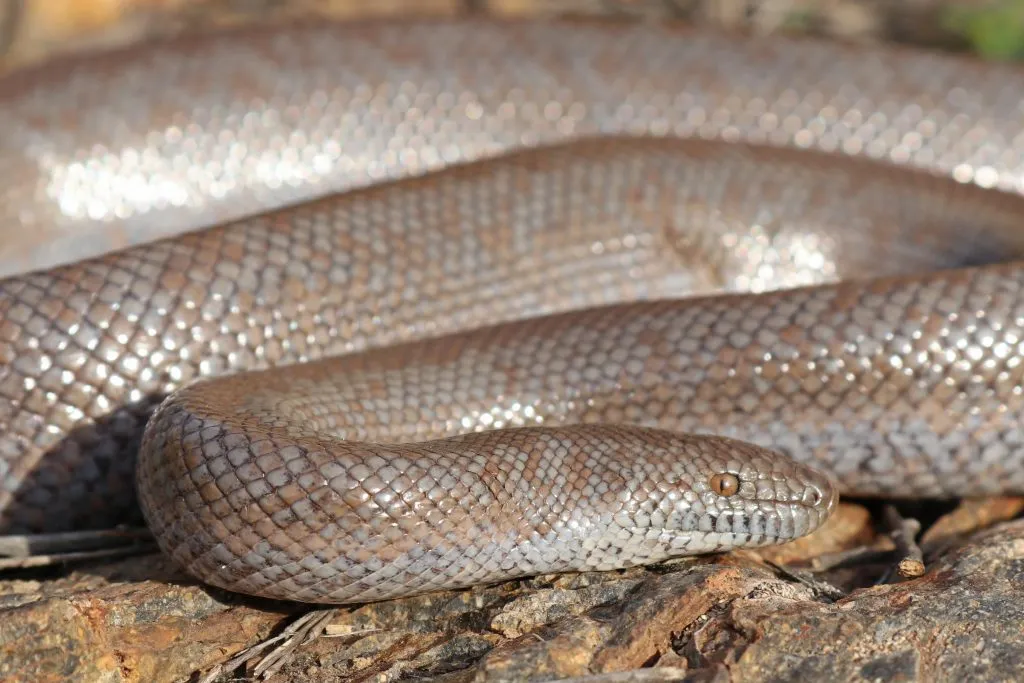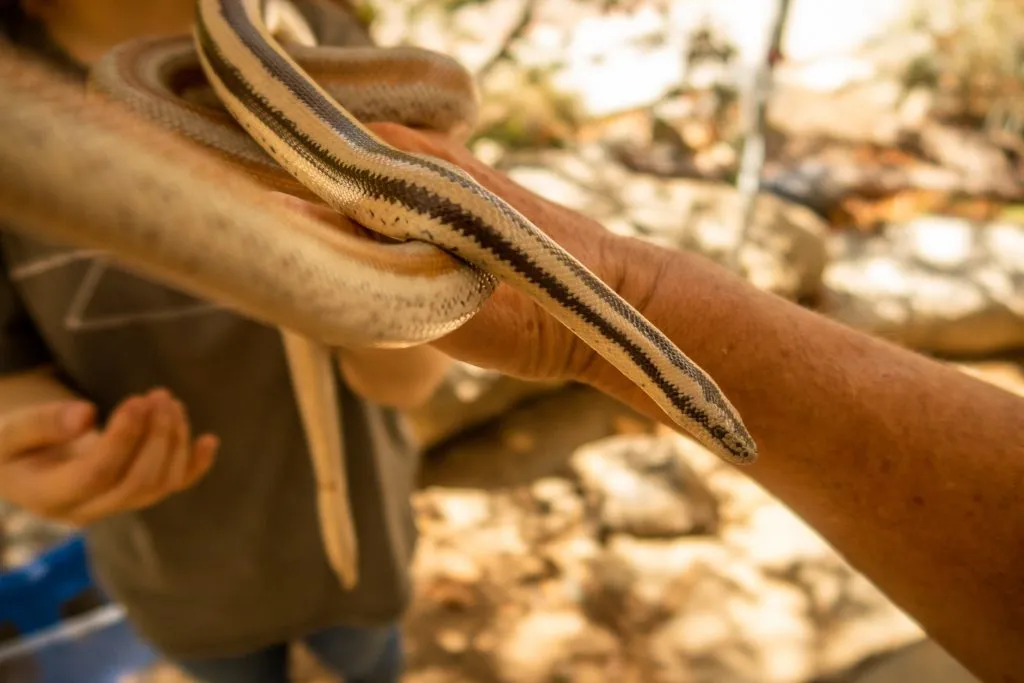
Rosy Boas are an ideal species for first-time snake owners because of their uncomplicated husbandry and manageable size. It’s part of our nature to be cautious around snakes, so a common question is whether or not rosy boas bite, and if so, how much does it hurt?
Rosy Boas are non-confrontational snakes that will only bite a human as a last resort. They’re non-venomous, which means there’s no chance of ill effects from zootoxins on the rare occasions they do bite. A bite may pierce the skin, but even adult Rosy Boas’ teeth are too small to inflict much pain or injury.
In this article, we discover more about the potential of being bitten by a Rosy Boa – including how to prevent being bitten, how to tell when a Rosy Boa is going to bite, and what to do if you are bitten.
Table of Contents
Do Rosy Boas Bite?
While Rosy Boas are capable of biting, it’s not their go-to method of defense. Wild Rosies tend to hide from predators and will often coil into a ball or hide from any perceived threat rather than bite them.
As a result, pet Rosy Boas will usually only bite due to fear or in response to mishandling.
Does It Hurt When Rosy Boas Bite?
Rosy Boas’ teeth are sharp and recurved, which helps them to grip their prey, but they’re tiny! Being a non-venomous species of snake, Rosies have no need for long fangs.
So, unless a Rosy bites you somewhere sensitive, it won’t be very painful.
Their small teeth can still draw blood, but a Rosy Boa bite won’t do much more damage than that. The level of pain is often compared to a sting or pinch, so a bite is more likely to scare you than scar you!

Are Rosy Boas Poisonous?
Poisonous means that something is harmful or fatal if you touch it, eat it or breathe it in, so a bite will not harm you in this way. In other words, you would have to bite your Rosy Boa for it to poison you!
Even if you did this (which we certainly don’t recommend!), Rosy Boas aren’t poisonous to humans.
How Can I Tell If A Rosy Boa Is Going to Bite?
Because Rosy Boas are usually docile, you may be able to notice signs of discomfort in your pet before it reaches the point where it bites. Signs to watch out for include:
- Pay attention to your Rosy’s body language. Most bites happen when snakes are being handled so look out for signs that your Rosy Boa isn’t comfortable with being held, such as coiling tightly around your hand or making striking motions with its head in your direction.
- Rolling into a ball. This is an indication that your Rosy Boa is scared or feels threatened. If your Rosy does this, it’s usually best not to continue handling it until it relaxes.
- Musking. Musking is when snakes release a foul-smelling liquid from their cloaca as a form of self-defense. The potent smell is to ward off potential predators, so if your Rosy begins musking, take it as a warning that they need to be left alone.
How To Prevent A Rosy Boa From Biting You
There’s no way to eliminate the risk of being bitten by a Rosy Boa altogether, but doing the following can minimize the chances of it happening:
1. Avoid Approaching Your Rosy Boa From Above
Approaching a snake from above can be intimidating because it’s how predators in the wild often approach them. Try to approach your Rosy Boa from the side or below so you don’t startle it.
2. Wash Your Hands Before Handling
Washing your hands ensures that there are no odors on them that could either disturb or attract your pet. Rosy Boas are ambush predators that rely on smell to locate their prey, so don’t make it think your hand is its next meal because it smells of chicken!
Tip: Is your rosy boa a picky eater? Read our article on that here!
3. Choose When To Handle Your Rosy Boa

Rosies tolerate handling well, but they can become stressed if they’re handled too often. Be sure to give a new Rosy plenty of time to settle before you try to hold it, and don’t handle it for a couple of days after feeding.
4. Don’t Hold Your Boa Too Tightly
Handle your Rosy gently while giving it some space to move around freely. You can help to make sure it feels safe by supporting it along its body and avoiding sudden movements.
5. Keep Your Rosy As Happy As Possible
Giving your Rosy a habitat that satisfies all its needs is one of the best ways to minimize the chance of a bite.
Doing regular check-ups and offering nourishment as well as hiding spots will keep your pet a content and stress-free snake that has no reason to bite.
- Enchi Ball Python: A Unique and Stunning Morph of Python regius - March 27, 2025
- Emerald Tree Monitor: The Enigmatic Green Guardian of the Rainforest - March 26, 2025
- The Egyptian Cobra (Naja haje): A Fascinating Serpent - March 25, 2025
